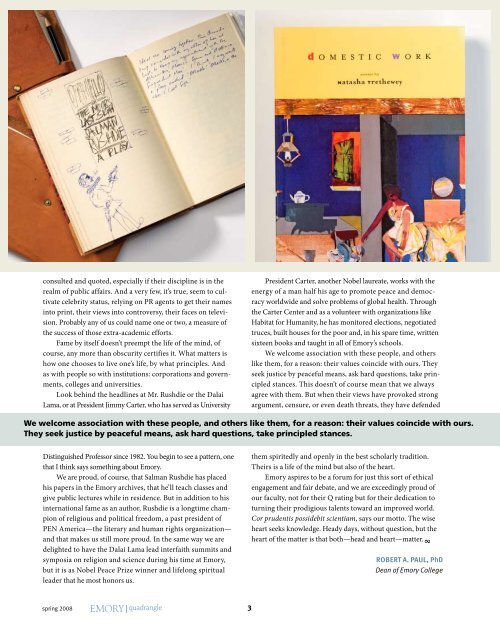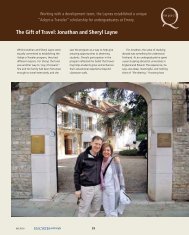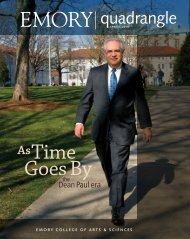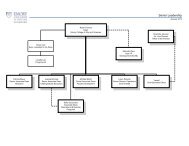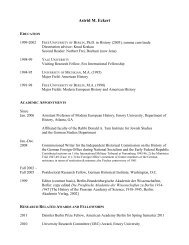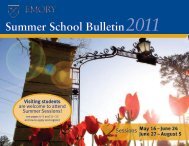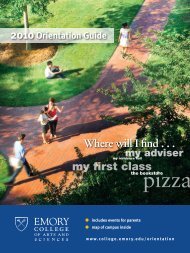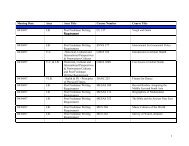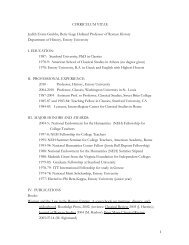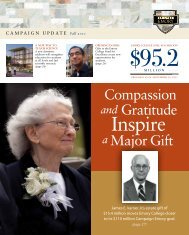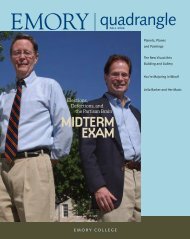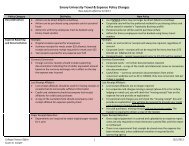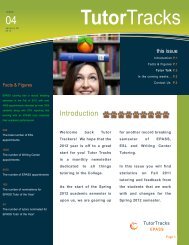Quadrangle Spring 08 - Emory College - Emory University
Quadrangle Spring 08 - Emory College - Emory University
Quadrangle Spring 08 - Emory College - Emory University
You also want an ePaper? Increase the reach of your titles
YUMPU automatically turns print PDFs into web optimized ePapers that Google loves.
consulted and quoted, especially if their discipline is in the<br />
realm of public affairs. And a very few, it’s true, seem to cultivate<br />
celebrity status, relying on PR agents to get their names<br />
into print, their views into controversy, their faces on television.<br />
Probably any of us could name one or two, a measure of<br />
the success of those extra-academic efforts.<br />
Fame by itself doesn’t preempt the life of the mind, of<br />
course, any more than obscurity certifies it. What matters is<br />
how one chooses to live one’s life, by what principles. And<br />
as with people so with institutions: corporations and governments,<br />
colleges and universities.<br />
Look behind the headlines at Mr. Rushdie or the Dalai<br />
Lama, or at President Jimmy Carter, who has served as <strong>University</strong><br />
President Carter, another Nobel laureate, works with the<br />
energy of a man half his age to promote peace and democracy<br />
worldwide and solve problems of global health. Through<br />
the Carter Center and as a volunteer with organizations like<br />
Habitat for Humanity, he has monitored elections, negotiated<br />
truces, built houses for the poor and, in his spare time, written<br />
sixteen books and taught in all of <strong>Emory</strong>’s schools.<br />
We welcome association with these people, and others<br />
like them, for a reason: their values coincide with ours. They<br />
seek justice by peaceful means, ask hard questions, take principled<br />
stances. This doesn’t of course mean that we always<br />
agree with them. But when their views have provoked strong<br />
argument, censure, or even death threats, they have defended<br />
We welcome association with these people, and others like them, for a reason: their values coincide with ours.<br />
They seek justice by peaceful means, ask hard questions, take principled stances.<br />
Distinguished Professor since 1982. You begin to see a pattern, one<br />
that I think says something about <strong>Emory</strong>.<br />
We are proud, of course, that Salman Rushdie has placed<br />
his papers in the <strong>Emory</strong> archives, that he’ll teach classes and<br />
give public lectures while in residence. But in addition to his<br />
international fame as an author, Rushdie is a longtime champion<br />
of religious and political freedom, a past president of<br />
PEN America—the literary and human rights organization—<br />
and that makes us still more proud. In the same way we are<br />
delighted to have the Dalai Lama lead interfaith summits and<br />
symposia on religion and science during his time at <strong>Emory</strong>,<br />
but it is as Nobel Peace Prize winner and lifelong spiritual<br />
leader that he most honors us.<br />
them spiritedly and openly in the best scholarly tradition.<br />
Theirs is a life of the mind but also of the heart.<br />
<strong>Emory</strong> aspires to be a forum for just this sort of ethical<br />
engagement and fair debate, and we are exceedingly proud of<br />
our faculty, not for their Q rating but for their dedication to<br />
turning their prodigious talents toward an improved world.<br />
Cor prudentis possidebit scientiam, says our motto. The wise<br />
heart seeks knowledge. Heady days, without question, but the<br />
heart of the matter is that both—head and heart—matter.<br />
Robert A. Paul, PhD<br />
Dean of <strong>Emory</strong> <strong>College</strong><br />
spring 20<strong>08</strong> 3


